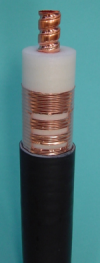RLKL114-50JFLAD
1-1/4" RADIAFLEX® RLKL Cable, A-series
Rev : P1 | Rev date : 26 Aug 2019
- RADIAFLEX® functions as a distributed antenna to provide communications in tunnels, mines and large building complexes and is the solution for any application in confined areas.
- Slots in the copper outer conductor allow a controlled portion of the internal RF energy to be radiated into the surrounding environment. Conversely, a signal transmitted near the cable will couple into the slots and be carried along the cable length.
- RADIAFLEX® is used for both one-way and two-way communication systems and because of its broadband capability, a single radiating cable can handle multiple communication systems simultaneously.
- This RADIAFLEX® radiating cable utilize a low-loss cellular polyethylene foam dielectric and a smooth copper outer conductor which offers a superior electrical performance together with good bending properties.
FEATURES / BENEFITS
- TETRA optimized cable
- Wideband from 30 MHz to 520 MHz
- For applications in tunnels and buildings
- Low coupling loss variations

picture shows generic slot pattern
General Specifications |
|---|
| Size | | 1-1/4 |
|
Electrical Specifications |
|---|
| Max. Operating Frequency | MHz | 520 | | Cable Type | | RLKL | | Impedance | Ohm | 50 +/- 2 | | Velocity, percent | % | 91 | | Capacitance | pF/m (pF/ft) | 73 (22.25) | | DC-resistance inner conductor, ohm/km (ohm/1000ft) | Ω/km (Ω/1000ft) | 2.4 (0.74) | | DC-resistance outer conductor, ohm/km (ohm/1000ft) | Ω/km (Ω/1000ft) | 1.95 (0.59) | | Stop bands | MHz | 34-37, 41-44, 82-86 | | Frequency Selection | MHz | 520 |
|
Mechanical Specifications |
|---|
| Jacket | | JFL | | Jacket Description | | Halogen free, non corrosive, flame and fire retardant, low smoke, polyolefin + flame barrier tape above outer conductor for lowest cable loss | | Slot Design | | Groups of vertical slots at short intervals | | Inner Conductor Material | | Corrugated Copper Tube | | Outer Conductor Material | | Overlapping Copper Foil | | Diameter Inner Conductor | mm (in) | 13.9 (0.55) | | Diameter Outer Conductor | mm (in) | 34 (1.34) | | Diameter over Jacket Nominal | mm (in) | 38.2 (1.5) | | Minimum Bending Radius, Single Bend | mm (in) | 325 (13) | | Cable Weight | kg/m (lb/ft) | 0.87 (0.58) | | Tensile Force | N (lb) | 2000 (440) | | Indication of Slot Alignment | | Guides opposite to slots | | Recommended / Maximum Clamp Spacing | m (ft) | 1.3 (4.25) | | Minimum Distance to Wall | mm (in) | 80 (3.15) |
|
Testing and Environmental |
|---|
| Jacket Testing Methods | | Test methods for fire behaviour of cable :
IEC 60754-1/-2 smoke emission: halogen free, non corrosive
IEC 61034 low smoke
IEC 60332-1 flame retardant
IEC 60332-3-24 fire retardant
UL1666, ASTM E 662, NES711 and NES713 |
|
Temperature Specifications |
|---|
| Storage Temperature | °C(°F) | -70 to 85 (-94 to 185 ) | | Installation Temperature | °C(°F) | -25 to 60 (-13 to 140 ) | | Operation Temperature | °C(°F) | -40 to 85 (-40 to 185 ) |
|
Attenuation |
|---|
| Frequency, MHz | Longitudinal Loss, dB/100 m (dB/100 ft) | Coupling Loss 50%, dB | Coupling Loss 95%, dB |
| 75 |
0.79 (0.24) |
49 (52) |
60 (62) |
| 150 |
1.12 (0.34) |
57 (59) |
60 (65) |
| 225 |
1.37 (0.42) |
57 (59) |
61 (65) |
| 380 |
1.95 (0.60) |
54 (57) |
58 (62) |
| 400 |
2.00 (0.61) |
53 (56) |
56 (60) |
| 420 |
2.12 (0.65) |
53 (56) |
55 (59) |
| 450 |
2.18 (0.67) |
52 (56) |
54 (58) |
| 470 |
2.30 (0.70) |
52 (56) |
54 (58) |
| 500 |
2.41 (0.74) |
51 (55) |
53 (57) |
|
Notes
- Coupling loss and longitudinal attenuation of RADIAFLEX® cables are measured according to IEC 61196-4. The cable tests are performed under free space method (cable in 2 m height).
- Coupling loss values are measured with dipole antenna.
- The coupling loss values given in brackets are average values of all three spatial orientations (radial, parallel and orthogonal). The best values among the three spatial orientations are stated as well.
- Coupling loss values are given with a manufacturing tolerance of +3dB (typ.) and longitudinal loss values with a manufacturing tolerance of +5% (typ.).
- In case of a conflict of operational and stop band, please contact RFS Technologies for further assistance.
- As with any radiating cable, the performance in actual building or tunnel environments may deviate from figures based on the free space method.

